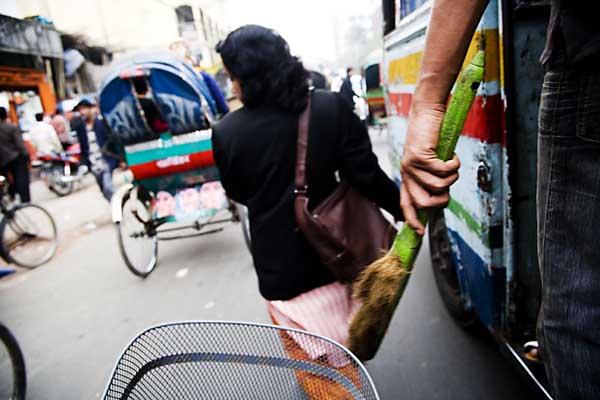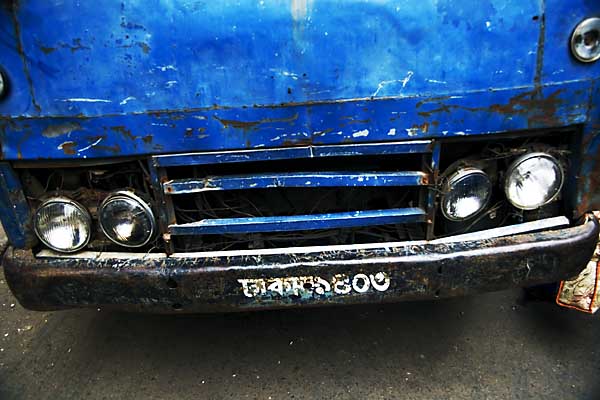![]()
![]()
The flower sellers and the popcorn venders were having a field day. The streets were jammed with traffic diverted from the University. Sales would be good.
 A range of different modes of transport plying Dhaka streets, makes the city roads difficult to negotiate. ? Shahidul Alam/Drik/Majority World
A range of different modes of transport plying Dhaka streets, makes the city roads difficult to negotiate. ? Shahidul Alam/Drik/Majority World
Dhaka University turned into a cantonment,’ said Rahnuma’s text message. I was hurrying to the CMM court in Old Dhaka where the trial of the university teachers was taking place. As I pedaled through the gaps between cars, rickshaws, CNGs (gas run three wheelers) and thalagaris (push carts) I felt glad I was on a bicycle.
 Dhaka University teachers leaving the CMM court in Old Dhaka. ? Shahidul Alam/Drik/Majority World
Dhaka University teachers leaving the CMM court in Old Dhaka. ? Shahidul Alam/Drik/Majority World
Ocassionally biking along the footpath, not strictly legal, I was slowed by the vending stalls and bus ticket counters that had sprung up. Legality was not such a big thing here.
 Bus ticket sellers in New Elephant Road. ? Shahidul Alam/Drik/Majority
Bus ticket sellers in New Elephant Road. ? Shahidul Alam/Drik/Majority
Last night, the guards had caught a guy stealing copper cabling. The thief was a “heroinchi”. They had roughed him up and let him go. Taking the guy to the police wouldn’t have helped. The police would have got richer and the guy would be out stealing again. People take law into their own hands. Bribes are common-place, violence is normalised, nepotism is ripe. Despite the rhetoric at the top, abuse of power is the order of the day. But there is a sub-text. It was wrong of the heroinchi to have stolen the cable, for me to have used the footpath, for the vendors to have taken over public pathways, for the policeman to have taken bribes. Except in my case, there were mitigating circumstances that made all of the other acts less of a crime. The heroinchi had his addiction to blame. The vendors had no other place to go, police salaries were impossible to live on. They might have found other solutions, but they broke the law instead. Unlawful, but not sinister.
I saw other things along the way. The policeman in Gulistan Mor puncturing the tyre of a rickshaw walla caught on a road reserved for cars.
 Policeman with needle used to puncture rickshaw tyres. ? Shahidul Alam/Drik/Majority World
Policeman with needle used to puncture rickshaw tyres. ? Shahidul Alam/Drik/Majority World

Policeman beating up rickshawalla. ? Shahidul Alam/Drik/Majority World
 Policeman controlling traffic at Nawabpur Road. ? Shahidul Alam/Drik/Majority World
Policeman controlling traffic at Nawabpur Road. ? Shahidul Alam/Drik/Majority World
 A bus conductor uses a brush handle to beat off nearby rickshaws or other ‘low grade’ traffic. ? Shahidul Alam/Drik/Majority World
A bus conductor uses a brush handle to beat off nearby rickshaws or other ‘low grade’ traffic. ? Shahidul Alam/Drik/Majority World
A policeman on Nawabpur Road, punching a rickshaw walla for some other reason. True, rickshaw wallas don’t always obey the law. But no policeman would have punctured the wheel of a car. No drug baron would ever be roughed up, no hotel owner would ever be shooed off his establishment.



 Dilapidated police prison vans outside CMM court. ? Shahidul Alam/Drik/Majority World
Dilapidated police prison vans outside CMM court. ? Shahidul Alam/Drik/Majority World

Military microbus by ‘no parking’ sign near Rapa Plaza in Dhanmondi. ? Shahidul Alam/Drik/Majority World
Few police cars would ever pass a fitness test. The more swank olive green cars, parked illegally, would never be challenged. When power is flouted with such abandon, corruption seeps to all levels. Ordinary people are simply too small to challenge the system. The rule of law must apply to all if it is to work. When the ruling party cannot be challenged, when a military rank gives total authority, when being in power means laws no longer apply, the law of the streets becomes the law of the land.
Much has been said about the students’ protest on campus in August 2007. Little has been said about the cause of the incident. The military cannot occupy a university campus in a free land. It is the duty of any self-respecting student, of any citizen, to challenge such army presence. The arrogance of the soldiers might have aggravated the incident. Their long held belief that they are above the law, surely led to the brutality that followed. But the original crime was one of occupation. And occupation, wherever found, must be resisted.
Why should university students bow to injustice? What values can future citizens uphold having silently accepted the loss of their freedoms? How can a teacher teach knowing he has turned his back to wards being illegally victimised?
 The back door of a prison van waiting outside CMM court. 21st January 2007. ? Shahidul Alam/Drik/Majority World
The back door of a prison van waiting outside CMM court. 21st January 2007. ? Shahidul Alam/Drik/Majority World
To convict and then provide presidential pardon, is an act of self-deification by the government. Those with less clout will continue to languish in jail. A dark and violent jail they should never have entered. If the judiciary be truly independent, then it should call to the docks those who ordered a military occupation of our university. It should bring to trial those who use emergency rule to torture our citizens and muzzle the media. It should penalise those who judge others without subjecting themselves to scrutiny. The rule of law is essential for society to live without fear. For it to apply, it must start at the top.
8 thoughts on “The Rule of Law”
Leave a Reply
You must be logged in to post a comment.

A chilling account of a breakdown. It is a reminder of the
> fragility of
> the rule of law we take for granted here in the UK.
Shahidul Bhai,
Thanks for the nice piece of writing. Well, I do agree with your arguments and observations. You have just narrated the real picture. I would add one thing with the ‘Rule of Law’ and that is “accountability”. Without rule of law and
accountability, a society, in other words, a nation cannot survive properly.
I have been struggling for the last two and half years just to make our ‘constitution’ available to the people. It is confined among few people and some of them are so called ‘constitutional experts’, who can’t come to a
consensus on constitutional issues. And trust me, when the ‘copyright’ of the constitution lies with the govt. where the ‘fundamental rights’ of a citizen are there and the so called experts and civil society don?t’ raise any question over the last 36 years, you can’t expect better than the prevailing situation. It is the people whether literate or illiterate (why they remain illiterate?)
who can make a difference. Unfortunately, we beg all the justices from the politicians and govt. officials including police and army. Can you tell me why they will ensure ‘Rule of Law’ for us? On the other hand, we are extremely
careless about the responsibilities of ‘public servants’. Please read article 7 and 21 of the Bangladesh Constitution. As an example I just referred the constitution, the supreme law of the land {Article 7(2)}. I would like to cite a quotation from Patrick Henry?s speech (the great leader of U.S.
independence), ‘The Constitution is not an instrument for the government torestrain the people, it is an instrument for the people to restrain the government-lets it come to dominate our lives and interests’. Interestingly, things are totally reverse in our country! Cheers! ?Long live our great politicians and the bureaucrats at all level. Go ahead with your own ways. Don?t think about the people but take care about your interests.’
—
Advocate Tanbir ul Islam Siddiqui
President
Change Makers
Room 101
155 Shantinagar
Dhaka 1217
Bangladesh
Tel: 880 2 8317579, 8314601, 1711 544325(Cell)
Fax: 880 2 8317726
E-mail: changemakers@bangla.net
Protest marches against all injustice always start at the Dhaka University campus and, consequently, all governments want to control that campus. Military forces of Bangladesh has nothing else to do other than oppressing their own people. Chief of Army acts like the King of Bangladesh and people are supposed to worship him.There is no humility in the attitude of the government or military personnel. They behave like they are not supposed to please little people, little people are supposed to please them. Who will fix these problems? Who will break this system?
When Chief Adviser and Chief of Army visited New York, we found that the Chief Advisor is unaware of the existence of the Enemy/Vested Property Act and the Chief of Army does not recognize religious minority groups in Bangladesh and their problems. He is unaware of the fact that religious minority groups exist in Bangladesh because of the 8th amendment, made by notorious Ershad. How can a country prosper by discriminating and persecuting a section of their own population? Can we separate prosperity of a country from the prosperity of its own people?
Jiten Roy
New York
As I view all these images from abroad, it allows me to see my motherland from the rear view mirror. What I see is depressing. The society as a whole has been dragged down the drain by all ruling establishments. So many things are going wrong. Policemen, in stead of going after criminals, are puncturing the tires of rickshaws, which are providing food and shelter for so many destitute families. Who will make them aware of their actions? The poor factory wokrkers get crushed as the wall colapses on them. Anybody will be liable for these deaths? Is there a judicial system in place, which could award punitive damages to these affected families, and punish the greedy corporation for running such an unsafe operation? Why we always see Slums on fire? Has anybody ever been punished for all these heinous acts? I believe answer to all these questions are ‘No.’
I cannot see anything to admire or be proud of from the existing systems of the land. My God! what systems we got from our leaders and forefathers? Could they be so non-visionary or talentless? US constitution is more than 200 years old and everyone wonders how founding fathers invisioned so many details, which were not needed then but vital today. The subway system in the New York City was built 150 years back, when it was not needed at all, which, today, transports millions of passengers everyday.
Jiten Roy,
New York